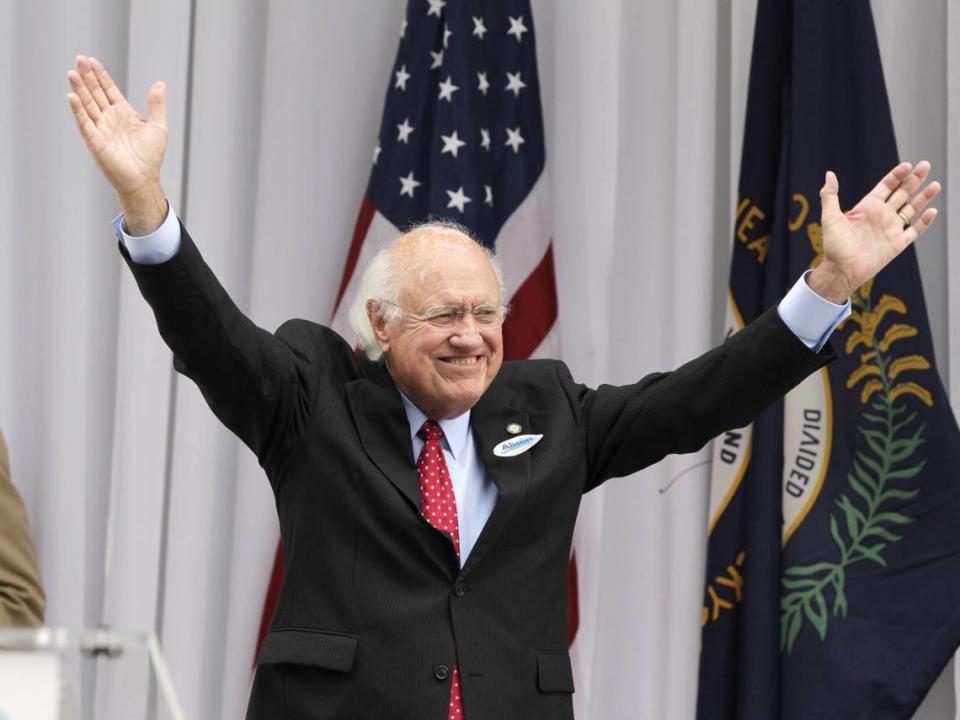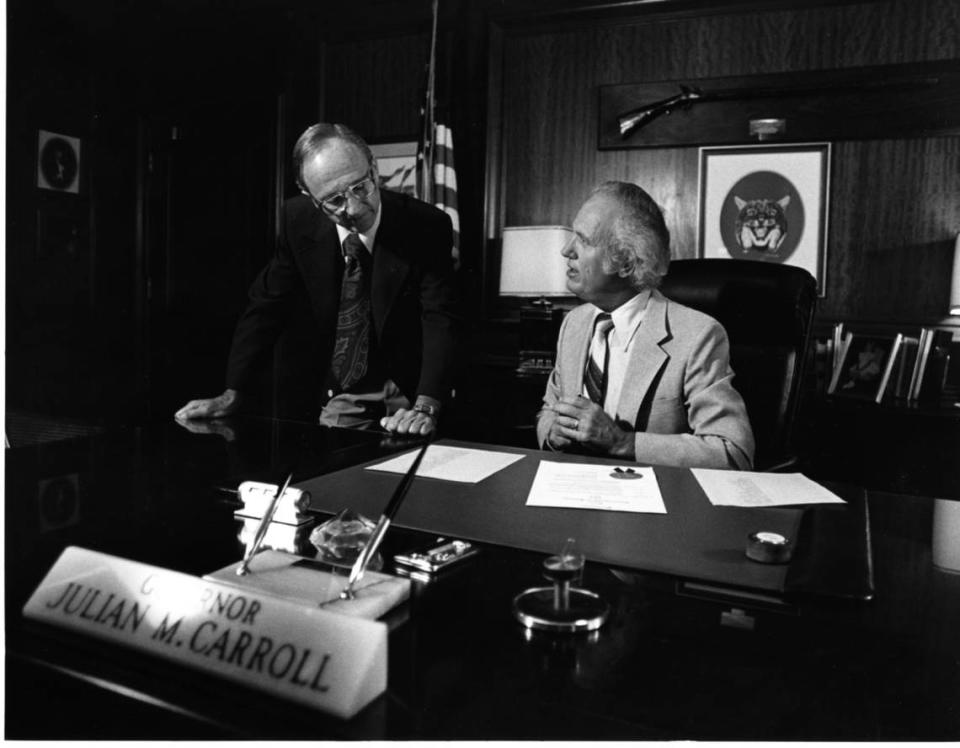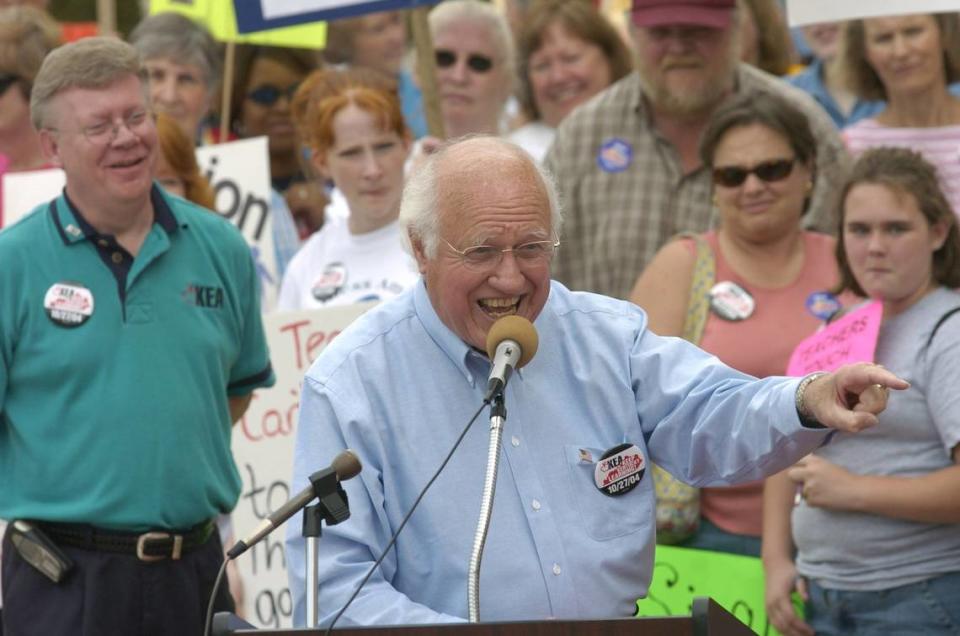Former KY Gov. Julian Carroll, who oversaw better school funding and court reforms, has died
- Oops!Something went wrong.Please try again later.
- Oops!Something went wrong.Please try again later.
Former Kentucky Gov. Julian Morton Carroll, a Democrat who in the 1970s oversaw a modernization of the state court system and improvements in public schools partly paid by a new coal severance tax, died Sunday morning at Frankfort Regional Medical Center.
“We are deeply saddened at the passing of our father, Julian Morton Carroll, who dedicated almost two-thirds of his life to being a committed public servant to this great Commonwealth of Kentucky,” the family said in a statement. “As a family, it is with the heaviest of hearts that we grieve the loss of our beloved father, grandfather and great-grandfather. His steadfast faith and positive outlook on life, his untenable and constant love for his family, and his giving heart and warm embrace will forever be missed.”
Carroll was 92 and spent his final months in hospice care at his home near Frankfort.
His wife, Charlann Harting Carroll, died in 2014 at the age of 81 after 64 years of marriage.
“Former Gov. Julian Carroll dedicated his career to public service,” Gov. Andy Beshear posted on social media. “For decades he worked to support public education and those he represented in Frankfort. Please join Britainy and me in praying for his family during this difficult time.”
“On behalf of the Kentucky House of Representatives, I extend our deepest sympathies to the Carroll family. While Kentucky lost a former Governor, they grieve the loss of a father, grandfather, and great-grandfather,” Kentucky House speaker David Osborne said in a statement released to the media. “Governor Carroll’s political life spanned more than six decades and included service in the Kentucky House and Senate, as well as terms as Lieutenant Governor and Governor. May his family find comfort in that service, as well as in knowing he is once again reunited with his wife, Charlann, and son Brad.”
In a 2011 interview with the Louie B. Nunn Center for Oral History at the University of Kentucky, Carroll said he crafted his own state budgets because he believed it was important for a governor to understand exactly where the taxpayers’ money was coming from and where it was going.
“I’d like to be known as a hands-on governor. Julian Carroll knew what was going on, and he was there, doing it,” Carroll said. “He knew every department.
“And quite frankly, I spent a lot of time creating relationships with my state employees. I had chicken lunches out on the grounds,” he said. “All my state employees would come out and have chicken with me.”
Carroll, a native of McCracken County born on April 16, 1931, served in the United States Air Force shortly after graduating from the University of Kentucky Law School in 1956.
A lawyer by trade, he served five terms as a state representative and was a House speaker in the 1960s and early 1970s. Voters elected him lieutenant governor in 1971. He rose to the state’s top office in late 1974 after Democratic Gov. Wendell Ford won election to the U.S. Senate.
Carroll won his own full four-year term as governor in 1975.
During his administration, Kentucky strengthened fire-safety laws and enforcement of mine-safety laws due to a series of fatal disasters, including a deadly blaze that tore through the Beverly Hills Supper Club in Southgate in 1977, killing 165, and coal mine explosions in Letcher County that killed 26.
Carroll administered a reorganization of the state’s antiquated court system, which voters authorized by approving a 1975 constitutional amendment. Among other things, the reforms established the Kentucky Supreme Court as the state’s highest court and removed judicial authority from county judges, who became judge-executives, the chief elected administrators in their county governments.
Carroll also threw his weight behind reform legislation eliminating private bail bondsmen.
Perhaps most significant, Carroll used additional state revenue, including money raised from a coal severance tax enacted by Ford, his predecessor, to spend more on K-12 schools, with teacher pay raises, new textbooks and new school buildings in poor communities.
“We actually doubled some teachers’ salaries from $8,000 a year at that time, believe it or not, to $16,000. A lot of the teachers see me these days and thank me for it because of the impact it made on their present retirement,” Carroll said in his oral history interview.
Two years after Carroll left office, a federal grand jury investigated his administration and Ford’s and indicted their former chairman of the Kentucky Democratic Party, Howard “Sonny” Hunt, on 22 counts for his alleged participation in a state workers compensation insurance fraud scheme.
Hunt pleaded guilty and served two years in prison. Ford and Carroll were never convicted of any wrongdoing.
In 1987, Carroll ran for governor again, but this time he placed fifth in the Democratic primary. Lexington businessman Wallace Wilkinson won the primary and the Governor’s Mansion that year.
Much later in life, in 2005, Carroll returned to the Capitol to serve 16 years in the state Senate (2004-2020), representing Franklin County, where he had established a law practice.
Carroll was removed from his leadership post by Senate Democrats in 2017 after allegations of groping and propositioning a man for sex in 2005. He didn’t resign his seat, and it was later discovered authorities declined to prosecute the case at the time of the allegations.




